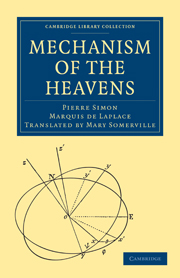PHYSICAL ASTRONOMY
Published online by Cambridge University Press: 29 August 2010
Summary
The infinite varieties of motion in the heavens, and on the earth, obey a few laws, so universal in their application, that they regulate the curve traced by an atom which seems to be the sport of the winds, with as much certainty as the orbits of the planets. These laws, on which the order of nature depends, remained unknown till the sixteenth century, when Galileo, by investigating the circumstances of falling bodies, laid the foundation of the science of mechanics, which Newton, by the discovery of gravitation, afterwards extended from the earth to the farthest limits of our system.
This original property of matter, by means of which we ascertain the past and anticipate the future, is the link which connects our planet with remote worlds, and enables us to determine distances, and estimate magnitudes, that might seem to be placed beyond the reach of human faculties. To discern and deduce from ordinary and apparently trivial occurrences the universal laws of nature, as Galileo and Newton have done, is a mark of the highest intellectual power.
Simple as the law of gravitation is, its application to the motions of the bodies of the solar system is a problem of great difficulty, but so important and interesting, that the solution of it has engaged the attention and exercised the talents of the most distinguished mathematicians ; among whom La Place holds a distinguished place by the brilliancy of his discoveries, as well as from having been the first to trace the influence of this property of matter from the elliptical motions of the planets, to its most remote effects on their mutual perturbations.
- Type
- Chapter
- Information
- Mechanism of the Heavens , pp. 1 - 3Publisher: Cambridge University PressPrint publication year: 2009First published in: 1831



